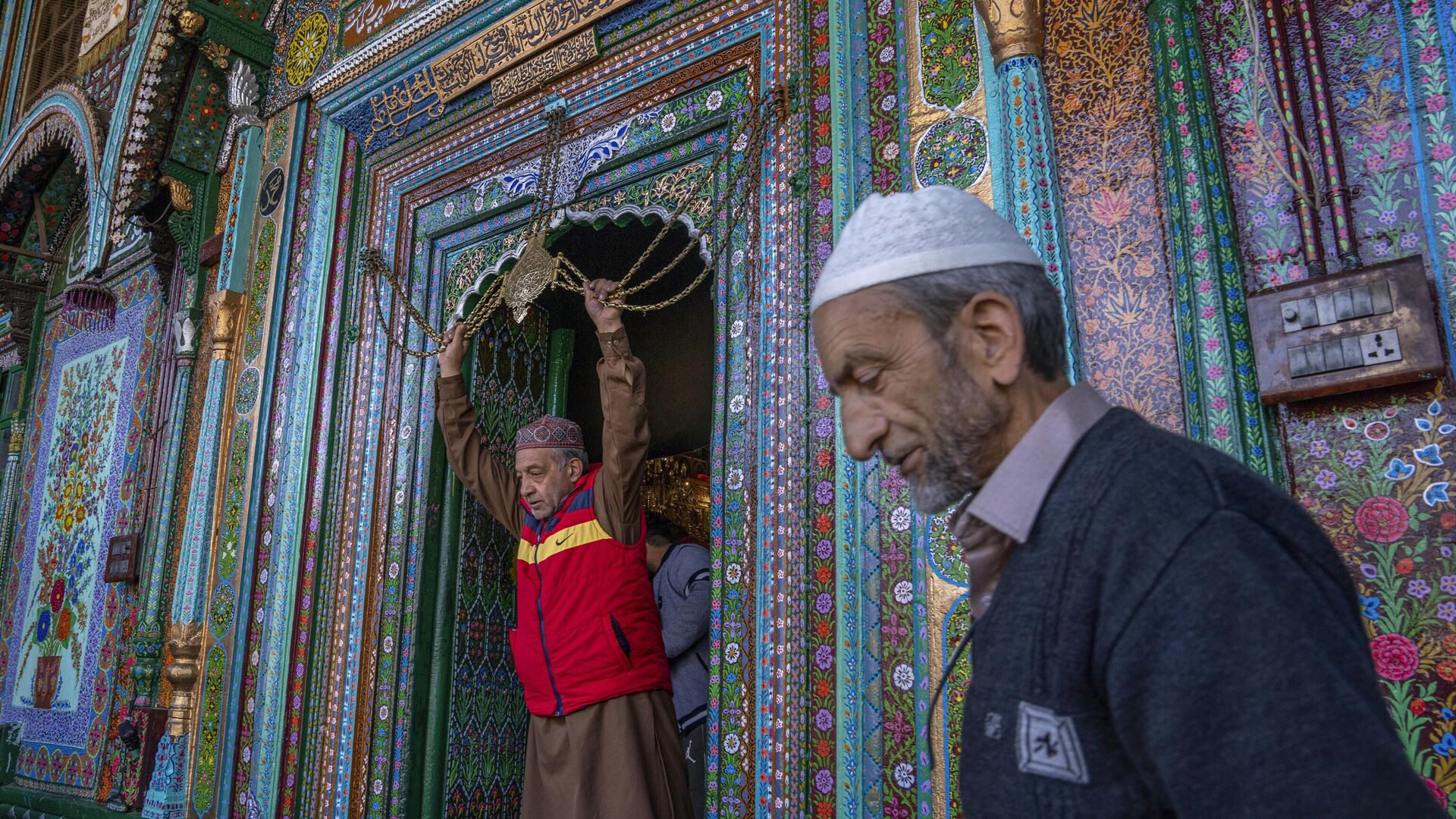https://sputniknews.in/20230604/why-india-is-seeking-a-uniform-civil-code-2258214.html
Why India is Seeking a Uniform Civil Code?
Why India is Seeking a Uniform Civil Code?
Sputnik India
The ruling Bharatiya Janata Party (BJP) states that driven by their policy of ‘Justice for All and Appeasement for None’ it is working within the ambit of the Constitution to implement the UCC in the country.
2023-06-04T08:00+0530
2023-06-04T08:00+0530
2023-06-04T08:00+0530
sputnik opinion
uniform civil code
india
muslim
hindu
political islam
world population
inclusive government
bharatiya janata party (bjp)
indian national congress (inc)
https://cdn1.img.sputniknews.in/img/07e7/04/0b/1498342_0:160:3072:1888_1920x0_80_0_0_c0500b5ad54f01c972d0ae17148bbb2b.jpg
The Uniform Civil Code (UCC) — a proposed law — is said to be an endeavor to formulate and implement 1.4 billion Indians' personal laws irrespective of their religion, or sexual orientation. It intends to shield the country's vulnerable communities, including women and religious minorities.If implemented, the UCC would replace the personal laws that are based on the scriptures and customs of various religious communities. It means a common set of rules will govern every Indian citizen. The code may make the existing regulations governing marriage ceremonies, succession, inheritance, and adoptions, more universal and cohesive. It may also work to benefit the LGBTQIA populace.However, some fear the code may infringe upon citizens' right to practice their chosen religious faith that enables communities to follow their own local laws.As the Narendra Modi government marks its 9th anniversary, Sputnik tries to explore the status of UCC, the government's logic behind pushing for it, and the skepticism gripping it.When Were Personal Laws Drafted in India?Notably, personal laws were originally drafted during the British Raj for primarily Hindus and Muslims. The then British officials tried not to interfere in this domestic matter, for fear of raising the ire of community leaders.The Indian Constitution's Article 44, however, requires the country to apply directive principles and common law for India's entire citizenry while establishing the nation’s policies."So, the BJP governments are well within their right to constitute a committee if they want to pass the law," he told Sputnik.However, he says, that will not be a Uniform Civil Code, it will be some state law. Because the Constitution in Article 44 says that the State should endeavor to have a Uniform Civil Code throughout the land of India. The law of a state does not apply beyond that State. "So, you are not going to really fulfill this requirement of Article 44."Why Do Personal Laws Need a Change?Stating that his consistent position on UCC that reforms are needed, Prof. Mustafa maintains there are discriminatory (personal) laws. Such laws must be made consistent with gender justice and the Constitutional mandate of equality.Is BJP Govt Ready For UCC?Asked how far the BJP seems to have progressed in implementing the UCC as per its poll manifestos, he explains that the BJP is not implementing it, rather they have taken the first step of constituting a committee."They have some bureaucrats. It is headed by one retired High Court judge. So, the committee does not inspire much confidence," he added.Why Does Muslim Personal Law Need Reforms?Prof. Mustafa says some part of the Muslim Personal Law has been reformed. Still, there is a part which is uncodified and this part has some provisions which may not be consistent even with Islamic Law. "Like Triple Divorce, which is not there in the Quran for instance."So, ideally, the Muslim community and Muslim reformers should have taken the lead, he maintains. "The Muslim Personal Law Board should have taken spearheaded the reform. But the board is controlled by the clergy who, generally, is not inclined to go for reform."Prof. Mustafa believes that when a community does not reform its laws, definitely the courts and the Parliament, and the political parties get an opportunity to reform the law themselves through legislation or through court judgments.But that is not good, he says. "So, there are some shortcomings by [the] Muslim leadership and the Muslim religious leadership as well, since they are not willing to even consider the reforms which have been made to Muslim laws in Muslim countries."According to Prof. Mustafa, they want to continue with Hanafi Law (one of the interpretations of the Islamic School of Thought), which on many points is very rigid and in some areas is not compatible with the Right to Equality and Justice.The legal scholar says while uniformity is considered to be crucial, it should be noted that uniformity in itself is far less important than unity. “We should endeavour to have unity, equality and justice, and this would in effect produce substantive equality rather than a mere formal or legalistic uniformity.”"And therefore the reform process should be such that people should not get suspicious about it," Prof. Mustafa suggests. He maintains that therefore some kind of legal pluralism may be incorporated into the Uniform Civil Code, "so that people's traditions and cultural practices and different modes of marriages, divorce, etc. which are compatible with the Constitution, are rethought."“A just code is far more important than a mere uniform code,” he suggests.Congress Questions Modi Govt's DiffidenceSpeaking to Sputnik, Gurdeep Singh Sappal, Advisor to Congress party chief Mallikarjun Kharge, said their party's stance has been very clear on the Uniform Civil Code. "Article 44 of the Constitution talks about the Uniform Civil Code. The question is what is going to be the draft of the UCC?"He also highlights that they say the draft is being put together by the Law Commission.Sappal, however, points out that the Law Commission has used up three years of its term. And its stint has almost expired. And for almost quarter to three years, they did not even post a chairman. "So today, it is incumbent on the BJP to produce a draft."The expert group, under the Law Commission, came out with its report. About the report, the BJP governments said that it was difficult to reconcile the family laws -- prevalent in the major parts of the country. So it is incumbent on the BJP government to prepare the draft. We will comment after the draft is produced, he says.When asked how Congress perceives the BJP-led Uttarakhand reportedly drafting the UCC, he argued that it was nothing but just bluffing.Sappal points out that this is the position of the current Modi government in Parliament as well as in the High Court. "So, whatever they are saying in the State is only for public consumption."He alleges that, actually, they (the government) have never produced a draft. "They have not produced a draft in any of the States or at the Centre."Sappal remarks that it's only cheating the public by making statements that are untenable in Parliament or in court "as per [the] Modi government's own stand also".The views and opinions expressed in this article are those of the experts and do not necessarily reflect the position of Sputnik.
https://sputniknews.in/20230525/congress-led-karnataka-govt-may-revoke-hijab-ban-2153138.html
india
Sputnik India
feedback.hindi@sputniknews.com
+74956456601
MIA „Rossiya Segodnya“
2023
Sandeep Datta
https://cdn1.img.sputniknews.in/img/07e7/04/07/1468069_0:258:1800:2058_100x100_80_0_0_3909870b82375b0693e9fd27915facc3.jpg
Sandeep Datta
https://cdn1.img.sputniknews.in/img/07e7/04/07/1468069_0:258:1800:2058_100x100_80_0_0_3909870b82375b0693e9fd27915facc3.jpg
News
en_IN
Sputnik India
feedback.hindi@sputniknews.com
+74956456601
MIA „Rossiya Segodnya“
Sputnik India
feedback.hindi@sputniknews.com
+74956456601
MIA „Rossiya Segodnya“
Sandeep Datta
https://cdn1.img.sputniknews.in/img/07e7/04/07/1468069_0:258:1800:2058_100x100_80_0_0_3909870b82375b0693e9fd27915facc3.jpg
why do people oppose uniform civil code? why uniform civil code is not implemented in india, can india ever have uniform civil code?why india should not implement uniform civil code? uniform civil code, uniform civil code article, uniform civil code, article 44, uniform civil code in which state of india, uniform civil code india, ucc india, india uniform civil code, why india need ucc? uniform civil code in india, uniform civil code demand in india, indian constitution's article 44,
why do people oppose uniform civil code? why uniform civil code is not implemented in india, can india ever have uniform civil code?why india should not implement uniform civil code? uniform civil code, uniform civil code article, uniform civil code, article 44, uniform civil code in which state of india, uniform civil code india, ucc india, india uniform civil code, why india need ucc? uniform civil code in india, uniform civil code demand in india, indian constitution's article 44,
Why India is Seeking a Uniform Civil Code?
The ruling Bharatiya Janata Party (BJP) states that driven by their policy of ‘Justice for All and Appeasement for None’ it is working within the ambit of the Constitution to implement the UCC in the country.
The Uniform Civil Code (UCC) — a proposed law — is said to be an endeavor to formulate and implement 1.4 billion Indians' personal laws irrespective of their religion, or sexual orientation.
It intends to shield the country's vulnerable communities, including women and religious minorities.
If implemented, the UCC would replace the personal laws that are based on the scriptures and customs of various religious communities. It means a common set of rules will govern every Indian citizen.
The code may make the existing regulations governing marriage ceremonies, succession, inheritance, and adoptions, more universal and cohesive. It may also work to benefit the LGBTQIA populace.
However, some fear the code may infringe upon citizens' right to practice their chosen religious faith that enables communities to follow their own local laws.
As the Narendra Modi government marks its 9th anniversary, Sputnik tries to explore the status of UCC, the government's logic behind pushing for it, and the skepticism gripping it. When Were Personal Laws Drafted in India?
Notably, personal laws were originally drafted during the British Raj for primarily Hindus and Muslims. The then British officials tried not to interfere in this domestic matter, for fear of raising the ire of community leaders.
The Indian Constitution's Article 44, however, requires the country to apply directive principles and common law for India's entire citizenry while establishing the nation’s policies.
According to noted academic and legal scholar Prof. Faizan Mustafa, the Constitution says that on Personal Laws both the Centre and State can make laws. When the setting up of the committees by Uttarakhand state on Uniform Civil Code were challenged in the apex court, the court refused to entertain the petition because both the Centre (federal government) and States are fully empowered to enact laws.
"So, the BJP governments are well within their right to constitute a committee if they want to pass the law," he told Sputnik.
However, he says, that will not be a Uniform Civil Code, it will be some state law. Because the Constitution in Article 44 says that the State should endeavor to have a Uniform Civil Code throughout the land of India. The law of a state does not apply beyond that State. "So, you are not going to really fulfill this requirement of Article 44."
Why Do Personal Laws Need a Change?
Stating that his consistent position on UCC that reforms are needed, Prof. Mustafa maintains there are discriminatory (personal) laws. Such laws must be made consistent with gender justice and the Constitutional mandate of equality.
"And it may not be possible to do it in one go. Therefore, the reform process maybe slow and gradual. And the reforms can be done in a piecemeal manner."
Is BJP Govt Ready For UCC?
Asked how far the BJP seems to have progressed in implementing the UCC as per its poll manifestos, he explains that the BJP is not implementing it, rather they have taken the first step of constituting a committee.
"As of now, there is no draft of the Uniform Civil Code available to anybody. Only Uttarakhand has made some progress. They have invited suggestions from the people. But the Uttarakhand Committee does not have experts on Personal Laws."
"They have some bureaucrats. It is headed by one retired High Court judge. So, the committee does not inspire much confidence," he added.
Why Does Muslim Personal Law Need Reforms?
Prof. Mustafa says some part of the Muslim Personal Law has been reformed. Still, there is a part which is uncodified and this part has some provisions which may not be consistent even with Islamic Law.
"Like Triple Divorce, which is not there in the Quran for instance."
"So, there is a need to codify Muslim Law and to make it consistent with the ideals for which Islam stands [for] like equality and justice. And such kinds of reforms are best done when there is an initiative to reform laws from within (the community)," says the legal luminary.
So, ideally, the Muslim community and Muslim reformers should have taken the lead, he maintains. "The Muslim Personal Law Board should have taken spearheaded the reform. But the board is controlled by the clergy who, generally, is not inclined to go for reform."
Prof. Mustafa believes that when a community does not reform its laws, definitely the courts and the Parliament, and the political parties get an opportunity to reform the law themselves through legislation or through court judgments.
But that is not good, he says. "So, there are some shortcomings by [the] Muslim leadership and the Muslim religious leadership as well, since they are not willing to even consider the reforms which have been made to Muslim laws in Muslim countries."
According to Prof. Mustafa, they want to continue with Hanafi Law (one of the interpretations of the Islamic School of Thought), which on many points is very rigid and in some areas is not compatible with the Right to Equality and Justice.
"So, the reform process of the Muslim Personal Law should be guided by the principles of Islam. So what the core values of Islam -- equality and justice -- and what are the core values of the constitution -- equality and justice," he highlights.
The legal scholar says while uniformity is considered to be crucial, it should be noted that uniformity in itself is far less important than unity. “We should endeavour to have unity, equality and justice, and this would in effect produce substantive equality rather than a mere formal or legalistic uniformity.”
"And therefore the reform process should be such that people should not get suspicious about it," Prof. Mustafa suggests.
He maintains that therefore some kind of legal pluralism may be incorporated into the Uniform Civil Code, "so that people's traditions and cultural practices and different modes of marriages, divorce, etc. which are compatible with the Constitution, are rethought."
“A just code is far more important than a mere uniform code,” he suggests.
Congress Questions Modi Govt's Diffidence
Speaking to Sputnik, Gurdeep Singh Sappal, Advisor to Congress party chief Mallikarjun Kharge, said their party's stance has been very clear on the Uniform Civil Code. "Article 44 of the Constitution talks about the Uniform Civil Code. The question is what is going to be the draft of the UCC?"
Sappal says India's main opposition party is just awaiting the draft. He points out that the BJP government has been talking about the UCC for several years. But it has failed to put forward any draft. It has told parliament that they are bringing in a draft. "But they have not done it."
He also highlights that they say the draft is being put together by the Law Commission.
Sappal, however, points out that the Law Commission has used up three years of its term. And its stint has almost expired. And for almost quarter to three years, they did not even post a chairman. "So today, it is incumbent on the BJP to produce a draft."
The expert group, under the Law Commission, came out with its report. About the report, the BJP governments said that it was difficult to reconcile the family laws -- prevalent in the major parts of the country. So it is incumbent on the BJP government to prepare the draft. We will comment after the draft is produced, he says.
When asked how Congress perceives the BJP-led Uttarakhand reportedly drafting the UCC, he argued that it was nothing but just bluffing.
"This is only a bid to cheat the public of that State. Because if you know, in Parliament, they (BJP) had given an answer, and it was also produced in an affidavit in the High Court in 2019 where the BJP government, the Modi government, had categorically said in the High Court that only Parliament can undertake the task of drafting the legislation. The States do not have the right."
Sappal points out that this is the position of the current Modi government in Parliament as well as in the High Court. "So, whatever they are saying in the State is only for public consumption."
He alleges that, actually, they (the government) have never produced a draft. "They have not produced a draft in any of the States or at the Centre."
Sappal remarks that it's only cheating the public by making statements that are untenable in Parliament or in court "as per [the] Modi government's own stand also".
The views and opinions expressed in this article are those of the experts and do not necessarily reflect the position of Sputnik.



